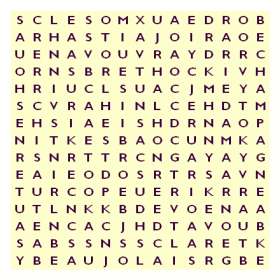“Four? That’s a random number!” Why would he choose four!?!?”
Because I couldn’t think of a fifth one, ok!!! Give me a break!!! Truth be told, I could have probably included more, but what is about to follow are the four I hear the most….but first…a short prologue…
Working in a wine bar, I’m constantly approached by Servers with the same type of question: “Hey Kris…..I have this guy who’s looking for a red wine. He wants raspberry, but also a little plummy taste. Light on the oak, but heavy on the tannin. European, but fruit-forward. He also said he likes spice, but hates dry wine. What do you suggest?”
”He just told you all that?” I’ll enquire.
”Yes, why? What do you think he’ll like?” the Server will respond.
The truth of the matter is, people generally have no idea how to describe what they like. No idea at all! I’m not saying this to try and poke fun at the less wine-savvy. I have no idea how to describe what I like either, and I make a living out of this stuff!!!
Describing wines is possibly one of the hardest things imaginable in the world of wine. Everyone has very personal tastes, and describing those tastes to someone else and expecting them to interpret them into a wine you will enjoy, is an almost impossible task! With all of that being said, I’d like to highlight four wine descriptors I hate:
Nice.
Once upon a time, I had a wine rep that used “nice” as her description on EVERY wine she’d describe to me i.e. “…this wine is nice…”, or “…this is a nice one….” I always remember thinking “I should bloody hope so! Why would she show me a wine that wasn’t ‘nice’?”
In this respect, I think it was just her way of getting round that fact that she didn’t actually know her product, and therefore had very little else to rely on. “Nice” is just a lazy descriptor. Most wines are “nice”. Asking for “…a nice glass of wine…” achieves very little at all. I’ve had very few wines that didn’t at least contain the smallest element of “niceness”.
Dry.
Saying a wine is “dry” is about as vague as descriptors get. Different wines are dry to different people. Californian Chards are dry to some. What about Loire Valley Muscadet? Mosel Riesling? Chablis? New Zealand Sauv Blanc?
It’s not that dry can’t be used as a descriptor, it’s just the way it’s used. Most often, people will ask me for a wine that “…isn’t dry”. I know by now that they’re looking for a wine that “…is sweet”.
If this is a descriptor you wish to employ to describe the kind of wine you are looking for, try thinking about which wines you’ve tasted previously that you personally deem to be “dry” in style.
Fruity.
ALL WINE is “fruity” in some form; whether that fruit is tropical, or citrus, or all the way through to dried prunes and raisins. Therefore, describing a wine as “fruity” tells you bugger-all about it!
I find this descriptor to be used much the same way as “dry”, i.e. “…can you suggest a wine that is fruity…?”
”Why certainly, Sir! Yes I can! Everything. Everything we have here contains fruit, in one form or another. Does that narrow it down?”
Once again, 99.9% of the time I find “fruity” to just mean “sweet”. If you really wanted to go down the “fruit path”, give thought to the kind of fruit you’re thinking of. Red fruit, blue fruit, black fruit, tropical fruit, stone fruit, or citrus fruit, for example.
After-Taste
In other words, the “finish”. Again, I find “after-taste” to be used frequently with a negative connotation. This may come as a surprise, but I quite often get asked to recommend a wine that has, and I quote, “…no aftertaste”. It stumps me every time! I’ve come close to saying “…would a glass of water fit the bill?”
I can’t ever think why you’d want a wine with no aftertaste, but then I realize that a number of wines on the market (50-90% of the selection at grocery stores) have very little aftertaste whatsoever….and that’s not a good thing!
I can’t think of situation where you might ever want to get specific when it comes to the particular “aftertaste” of a wine. It’s one descriptor you should just leave alone.
Conclusion
If you find yourself in the position of trying to describe your tastes in order to find a wine that suits your needs, I always find the best way to approach it is to reel off a list of wines that you’ve enjoyed in the past. If you tell a Server “I like Chianti, and Spanish reds”, or “I like Australian Shirazes”, they should have a pretty good idea of the direction to lead you in. This as opposed to giving an endless list of very personal and very pointless wine descriptors.



Karin McKercher
“Nice” is all-around bad, regardless of whether you’re describing wine or women. EG. I hooked my brother up on a blind date some 20 years ago. “She’s really nice,” I said. He interpreted, “She’s ugly.” Note: She’s not, and they’ve been married for 17+ years now. Does “I like a wine that bitch-slaps me” work for you, though? ‘Cause I kind of like that one.
Ken ✔ #wine
How about… “interesting”